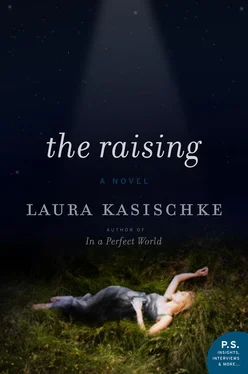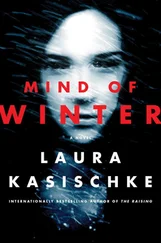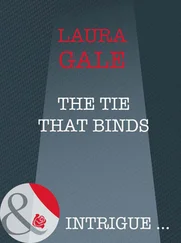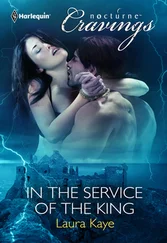And then they’d let her murderer back into the university. Despite the public protests, the outrage, the letters to the editor of the student and local papers, the university lawyers had concluded that since no criminal charges had been filed against him, they had no grounds for keeping him out. Only the Honors College had the balls to ban him, and everyone knew that was only because the dean, who was old pals from Dartmouth with the boy’s father, had bent all the rules to admit him in the first place, and didn’t want that getting any more press than it already had.
There were goose bumps on her arms now. Wrapping her arms around herself, Mira realized that not only had she shivered, but now she was trembling. She worried that her teeth might begin to chatter. It was truly autumn. The sun had clearly slipped a few notches down on the horizon, and the light on the leaves was amber now, not white, not even golden, as it had been the week before, and a breeze seemed to be pouring through the centuries-old windows of Godwin Honors Hall despite the fact that they were all closed. That cold breeze seemed to pour in a steady stream down the hallway, bathing her.
“I know you’re an expert on death,” the boy said to her, “and dying, and the undead. All I know about is Nicole and Craig. But there are… circumstances. I could tell you, but you might think I was nuts. Basically, I just need to know more, and I thought your seminar might help me with that.”
Perry had—on purpose, most likely—picked out an apartment for them that was as far from Godwin Honors Hall as you could get within the boundaries of the same circumscribed college town. And since Craig no longer had any classes at the Hall, he had no reason to go there. Still, he found himself standing outside of it within an hour of the dismissal of his first class of the semester, staring up at the window of the room he was certain had been hers—fourth from the end, facing East University Avenue.
The window was open. The curtains were closed. They rippled a little, without parting. A flock of starlings circled the roof, landing and rising over and over in a mass that managed to look both fluid and nervous. The wrought-iron gate around the courtyard was freshly painted. Black. And the grass was emerald green. The branches of the walnut tree near the entrance were bowed under the weight of big green fruit, and every few minutes one of those walnuts fell from the tree and onto the lawn with a muffled thump.
Craig didn’t know how long he stood there, but for whatever period of time it was, no one entered or exited Godwin Hall. No one passed him on the sidewalk. No one parted the curtains and looked out a window. And not a sound came from anything except for those occasional thuds of a walnut, and the starlings—but only their wings, very swift and distant, churning up the air around the roof.
It could have been, he realized, a year to the very day that he’d opened the door on that Tuesday night, thinking it would be Perry, who’d left for the lounge with his cell phone to call his mother (did he think he’d locked himself out?), and found her standing in the hallway instead.
“Hi. Is Perry here?”
Her hair was pulled back in that ponytail, and he could see how a few brilliant threads had worked loose around her face, and how they were lifting and falling weightlessly with her breathing.
Later, he’d remember the exchange as having taken place in slow motion:
Nicole Werner turned her face away from Craig, and looked down the hallway—for Perry, presumably, but also probably so she wouldn’t have to look at him, naked except for the boxers—and the trick of light on those loose blond strands made him feel as if he, too, were floating brightly in the air around Nicole Werner.
“No,” he said, sounding underwater to himself. By then she’d already raised her hand to Perry, who was walking toward them with Craig’s cell phone in his hand and a desolate expression on his face, as if he’d just gotten news that the love of his life was imprisoned in Turkey.
It amazed Craig then how casually Perry nodded to the heavenly creature who’d come looking for him. As if she were his sister, or as if, in Bad Axe, girls who looked like her grew on trees.
At Craig’s high school in New Hampshire there’d been only seventy-one students in his class at the time of his graduation, and only twenty-nine of them had been girls. Occasionally there’d be a new one, but usually she stayed only a few months, half a year—maybe she’d flunked out of her boarding school or come to town from Boston or Manhattan to live with the noncustodial parent for a while.
Otherwise, Craig had known those twenty-nine girls since he was in kindergarten. His parents knew their parents. He’d taken skiing lessons and swimming lessons and tennis lessons with them. He’d called them names, and had been called names by them. He’d seen them emerge from the girls’ bathroom with eyes swollen red from crying, or dashing into the girls’ bathroom in their prom dresses to vomit up vodka and Fruitopia. He’d fooled around with a few, had sex with a few, been slapped in the face hard by one of them. And he had never seen anyone like Nicole Werner:
The pink cheeks, the serious expression, the sincerity radiating off of her so nakedly he wanted to close his eyes, or throw a coat over her.
She was the All-American Girl.
Eventually, he’d had to take a step back.
“You hate chicks, don’t you?” his best friend Teddy, his only real friend back in New Hampshire, had said to him in the high school cafeteria once—and then stuttered, “I-I-I mean, not like you’re a fag, you j-j-just—”
“I like chicks,” Craig had said. “Just not these chicks. Not here. ”
He’d meant Fredonia High, and he’d believed it to be true—that they were, all of them, a special breed of brainless, or bitch.
Except, he had to admit, he didn’t like the chicks at the Quaker camp he went to in Vermont every summer, either. And he didn’t particularly care for the tourist girls who passed through town with their parents. Or the girls his cousin in Philadelphia had introduced him to over winter break.
“Ah,” his father had said once when Craig tried to draw him out on the subject of females. “The war between the sexes. It’s as old as time.” He went on to tell Craig a story about a nurse he’d met in Vietnam. The Perfect Woman. She’d ended up marrying his buddy. “I set it all up,” his father said wearily. “I knew if I had anything to do with her, it would ruin her.”
“What happened to her? To them?” Craig asked.
His father shook his head. “Don’t know.”
When Craig’s little brother, Scar, turned thirteen and asked Craig for advice about girls, the only thing Craig could think of to say was, “Just forget it, man.”
“Thanks, man,” Scar had said, without irony, and wandered back to his own room, where, it seemed to Craig, the kid had proceeded to take the advice:
By the time Craig left for college, Scar was fifteen, and spent most of his time at the computer, blowing things up. Craig had been waiting for the last two years for one or both of his parents to say something to Scar about the “productive use of time,” or the “mind-numbing soul-sapping” nature of video games, but they never said a word. Maybe they’d used up all their parental energy on Craig.
Or maybe it was because, by the time Craig graduated from high school, they seemed to spend all of their time, too, in front of their computers. His father, Craig knew, was writing, or trying to write. His mother, he guessed, was doing something she also considered work, but wasn’t. She’d taken to answering her cell phone by saying, “This is Lynnette Rabbitt,” as if someone besides her friend Helen or her personal trainer might be calling. Occasionally Craig considered asking her what she was doing on the computer, but he always ended up following his father’s advice when it came to his mother:
Читать дальше












